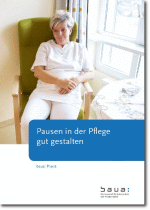With more than 1.9 million employees, professional nursing in inpatient and outpatient care settings is one of the most important pillars within the German healthcare sector. Creating health-promoting working conditions for nursing staff is an essential task for persons and institutions responsible for work design in this field.

High significance of work – but also high workload
The work performed by professional nurses is of enormous societal significance. The approximately 1.9 million people employed in this field in Germany contribute crucially services of general interest every day. At the same time, they have to cope with high physical and mental demands ranging from lifting and carrying heavy loads to handling severe time pressure or challenging behaviour of people in need of care as well as their relatives.
Particular challenges in professional nursing
The COVID-19 pandemic aggravated existing problems in work design and added new challenges such as a noticeably increased risk of infection, impediments resulting from the necessity to wear personal protective equipment at all times, or challenges in the interaction with people in need of care or their relatives resulting from contact restrictions. This resulted in a considerable intensification of workload in many areas of professional nursing. The increasing need for professional care - driven by the ongoing demographic changes - currently contrasts with a serious nursing staff shortage. One important reason for this is the fact that working conditions in hospitals, nursing homes and home care are not favourable for maintaining and promoting nurses´ health and, thus, lack attractiveness at present. For instance, staff shortages make it more difficult to meet care recipients’ needs properly, working times are often unreliable and recognition as well as appreciation is still unsatisfactory. In addition, work in professional nursing is physically as well as mentally demanding per se and regularly necessitates shift work as well as work on weekends and public holidays.
Creating health-promoting working conditions for the large group of employees in this field is therefore essential - also in view of the goal to provide high-quality care in the future.

The Decent Ward Organisation guide supports hospital nursing teams in improving aspects of their work organisation. This document structures the action to be taken and offers valuable tips for the practical implementation of changes to work organisation - from surveying the baseline situation to devising and implementing suitable measures. Additionally, the guide includes links to downloadable materials and checklists.
Research for practice
Within the Federal Institute for Occupational Safety and Health (Bundesanstalt für Arbeitsschutz und Arbeitsmedizin, BAuA), the “Designing Service Work” Unit conducts research on how to design health-promoting work in professional nursing. We want to find out which organisational interventions can help practitioners to cope with unfavourable combinations of stressors. In this context we also investigate the potential and limitations of using digital technologies within nursing work. Our findings flow in guidelines for practitioners and are being discussed within professional events with professional nurses, nursing managers, and people responsible for occupational safety and health. In addition, our research findings are used for science-based policy advice at federal and state level.
Current research topics
The following topics are addressed in our research projects – which are carried out in close cooperation with representatives of nursing practice as well as experts in this field.
Work organisation in outpatient nursing
Decent work organisation in professional nursing is not only an important prerequisite for well-functioning processes but also indispensable for nurses´ well-being, health, and motivation. If everything ”fits” here there are demonstrably positive effects on the quality of nurses’ work, absenteeism, and employee retention.
baua: Guidance: Decent Ward Organisation - A Guide for Nursing Teams in Hospitals
Organisational interventions as part of pandemic management in inpatient care
Professional nurses belong to one of the largest vocational groups in Germany and were already exposed to unfavourable working conditions prior to the COVID-19 pandemic. The pandemic aggravated existing work-related challenges and created new ones - such as an increased risk of infection, additional staffing shortages or the necessity to change aspects of work organisation in response to short-term staff absences.
Rest breaks and recovery in professional nursing
Many professional nurses skip their rest breaks. However, ensuring rest breaks is mandatory by law because rest breaks have been shown to protect employees’ health and work safety. Moreover, many nursing studies found ergonomic rest break design to improve nurse performance and care quality and even to reduce nurse turnover.
baua: Guidance: Appropriate Rest Break Arrangements in Nursing and Care



